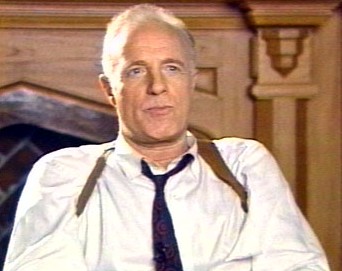
From the Wikipedia entry: "Raymond Thornton Chandler (July 23, 1888 – March 26, 1959) was an author of crime stories and novels. His influence on modern crime fiction has been immense, particularly in the writing style and attitudes that much of the field has adopted over the last 60 years. Chandler's protagonist, Philip Marlowe, has become synonymous with the tradition of the hard-boiled private detective, along with Dashiell Hammett's Sam Spade.
He taught himself to write pulp fiction in an effort to draw an income from his creative talents, and his first story, "Blackmailers Don't Shoot," was published in Black Mask in 1933. His first novel, The Big Sleep, was published in 1939.

Chandler worked as a Hollywood screenwriter following the success of his novels, working with Billy Wilder on James M. Cain's novel Double Indemnity (1944), and writing his only original screenplay, The Blue Dahlia (1946). Chandler also collaborated on the screenplay of Alfred Hitchcock's Strangers on a Train (1951), a story he thought implausible (Chandler was notorious for his intense dislike of Alfred Hitchcock, whom he often referred to as "that fat bastard").
 Chandler's finely wrought prose was widely admired by critics and writers from W.H. Auden, Evelyn Waugh to Ian Fleming. Although his swift-moving, hardboiled style was inspired largely by Dashiell Hammett, his use of both sharp and lyrical similes in this context was quite original. Turns of phrase such as The muzzle of the Luger looked like the mouth of the Second Street tunnel, and The minutes went by on tiptoe, with their fingers to their lips, defines private eye fiction and a Chandleresque literary style, which is also the subject and object of innumerable parodies and pastiches.
Chandler's finely wrought prose was widely admired by critics and writers from W.H. Auden, Evelyn Waugh to Ian Fleming. Although his swift-moving, hardboiled style was inspired largely by Dashiell Hammett, his use of both sharp and lyrical similes in this context was quite original. Turns of phrase such as The muzzle of the Luger looked like the mouth of the Second Street tunnel, and The minutes went by on tiptoe, with their fingers to their lips, defines private eye fiction and a Chandleresque literary style, which is also the subject and object of innumerable parodies and pastiches. However, his most famous character, Philip Marlowe, is not a stereotypical tough guy, but rather a complex and sometimes sentimental figure who has few friends, attended college for awhile, speaks a little Spanish, at times admires Mexicans, and is a student of chess and classical music. He will also refuse money from a prospective client if he is not satisfied that the job meets his ethical standards.
 (His wife) died in 1954 after a long illness, during which Chandler was writing The Long Goodbye. Lonely and depressed, he turned once again to drink and never again turned away for long. His writing suffered in quality and quantity, and he attempted suicide in 1955. His life was both helped and complicated by the women who attracted his attention, notably Helga Greene (his literary agent); Jean Fracasse (his secretary); and Sonia Orwell (George Orwell's widow), who believed Chandler was a repressed homosexual. After a stay in England he moved back to La Jolla where he died, of alcoholism and pneumonia, at the Scripps Clinic. Helga Greene was awarded his estate after a legal wrangle with Fracasse. Chandler was buried at Mount Hope Cemetery, in San Diego. According to Frank MacShane, the author of The Raymond Chandler Papers, the struggle over his estate resulted in Chandler being interred in a section reserved for paupers and indigents."
(His wife) died in 1954 after a long illness, during which Chandler was writing The Long Goodbye. Lonely and depressed, he turned once again to drink and never again turned away for long. His writing suffered in quality and quantity, and he attempted suicide in 1955. His life was both helped and complicated by the women who attracted his attention, notably Helga Greene (his literary agent); Jean Fracasse (his secretary); and Sonia Orwell (George Orwell's widow), who believed Chandler was a repressed homosexual. After a stay in England he moved back to La Jolla where he died, of alcoholism and pneumonia, at the Scripps Clinic. Helga Greene was awarded his estate after a legal wrangle with Fracasse. Chandler was buried at Mount Hope Cemetery, in San Diego. According to Frank MacShane, the author of The Raymond Chandler Papers, the struggle over his estate resulted in Chandler being interred in a section reserved for paupers and indigents."
“ I see him always in a lonely street, in lonely rooms, puzzled but never quite defeated,... ”
—In a letter to a curious fan regarding Philip Marlowe's character and habits in Raymond Chandler: Speaking
“ From thirty feet away she looked like a lot of class. From ten feet away she looked like something made up to be seen from thirty feet away. ”
—The High Window
"She gave me a smile I could feel in my hip pocket"
—Farewell, My Lovely (Chapter 18)
"I was neat, clean, shaved and sober, and I didn't care who knew it."
—The Big Sleep (Chapter 1)
"It was a blonde. A blonde to make a bishop kick a hole in a stained glass window."
—Farewell, My Lovely (Chapter 13)
"I never saw any of them again - except the cops. No way has yet been invented to say goodbye to them."
—The Long Goodbye (Chapter 52)


 Robert Mitchum as Marlowe (he portrayed the private eye twice, first in 1975's Farewell, My Lovely, then in The Big Sleep, from 1978)
Robert Mitchum as Marlowe (he portrayed the private eye twice, first in 1975's Farewell, My Lovely, then in The Big Sleep, from 1978)

Here are Bogie and Bacall (as Vivian Sternwood Rutledge) in the trailer for The Big Sleep (1946):
No comments:
Post a Comment